© 2026 ALLCITY Network Inc.
All rights reserved.

Let’s start this Round 2 preview between the Colorado Avalanche and St. Louis Blues by establishing something that I think is important: This is not last year and the regular-season meetings between these two teams do not matter.
There might be plenty of optimism about the Avs-Blues matchup in Colorado, but last year’s sweep of the Blues in Round 1 should not play any part in it. Both teams are quite a bit different. Ryan O’Reilly might have said some cocky things that force-fed back to him after the series, but that was then. Let’s agree to move on.
The three regular-season matchups occurred in the first 10 games of the season and then Game 81. You might remember those are the two stretches of the season that proved to be the major outliers for Colorado.
So, all of that said, what should we be looking for as the Blues and Avs clash again? As always, I’m here to hockey nerd it up. Let’s look at who they were during the season.
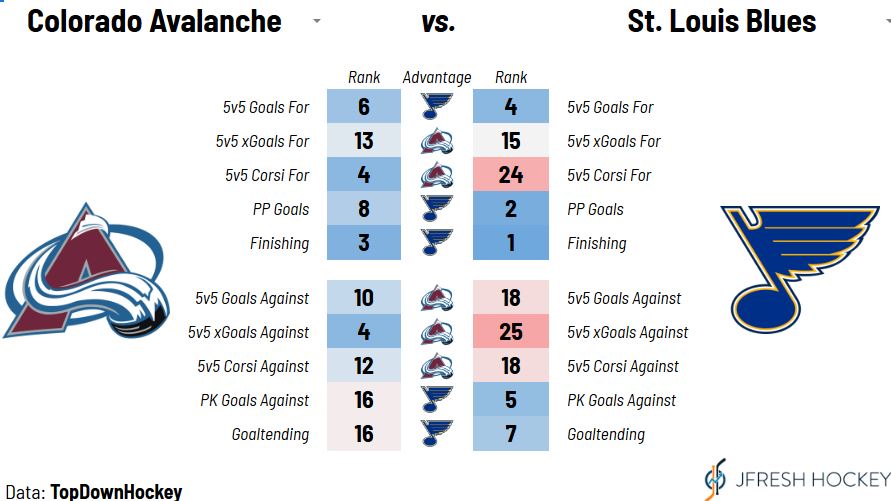
A few things stick out to me here.
The big one is that while the Blues finished at an elite rate this season, the actual quality and quantity of chances they generated wasn’t very impressive. It’s really hard to keep that up in the playoffs when facing exclusively good teams, so that’s their first challenge.
The other thing to note here is that while the Blues get great marks for goaltending, the real strength of that position was Ville Husso coming in and bailing out Jordan Binnington when Binnington hit a major rut and played very poorly during the season. Husso actually wrested the job away and started the Round 1 series against the Minnesota Wild, but Binnington finished it.
While St. Louis was able to get away with the goalie carousel, the uphill climb against Colorado is going to be a little steeper. Giving away a game or two with a goalie who doesn’t have it might not be a recoverable situation.
Other than that, you see that both teams are excellent at scoring goals both at 5v5 and on the power play. That continued for both teams during the first round and which unit gets slowed up the most will be a huge key for this series.
The last point I want to make here is that this St. Louis team carries with it the reputation of past clubs as a strong defensive team that is hard to play against. That is simply not the case with this Blues defense. Not only have injury issues put Torey Krug’s status in doubt for the series, but Marco Scandella’s availability is, at least for now, also a question mark.
Even if those two were healthy, you can see above that the defensive side of the puck is not one that has been a strength of the Blues this year. They are far more of the firewagon hockey team than you would ever previously associate with the Blues.
To further illustrate this identity of the Blues as an opportunistic club that has outperformed the quality of play it put onto the ice, let’s look at a few other pieces of data.
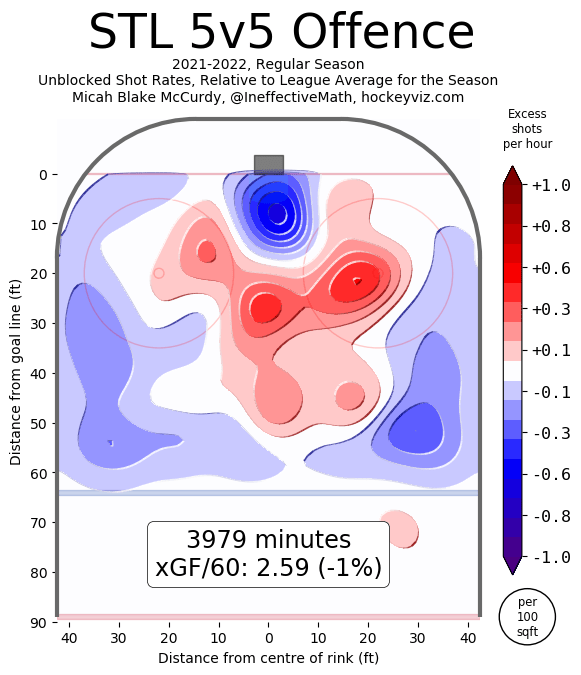
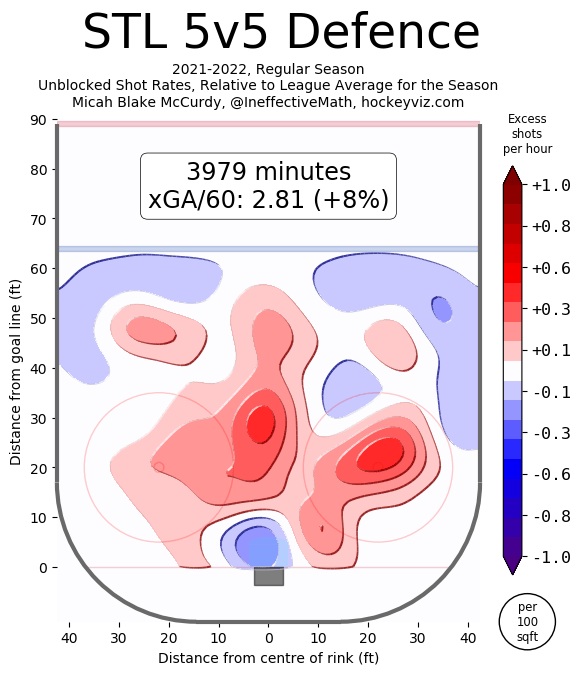
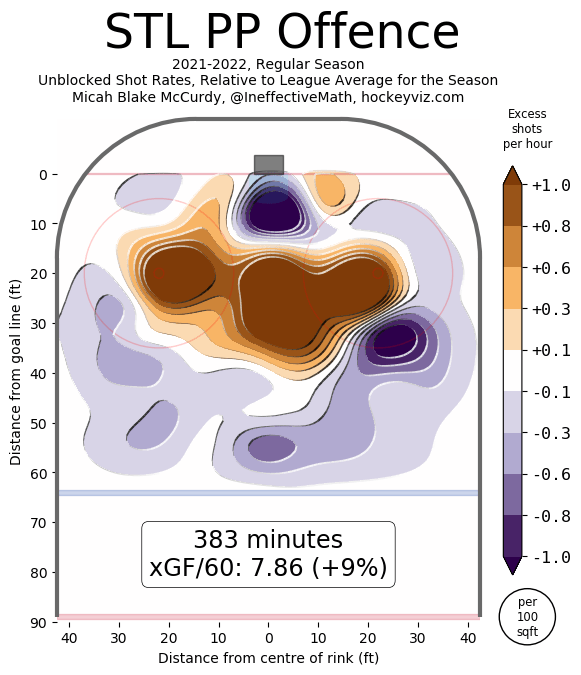
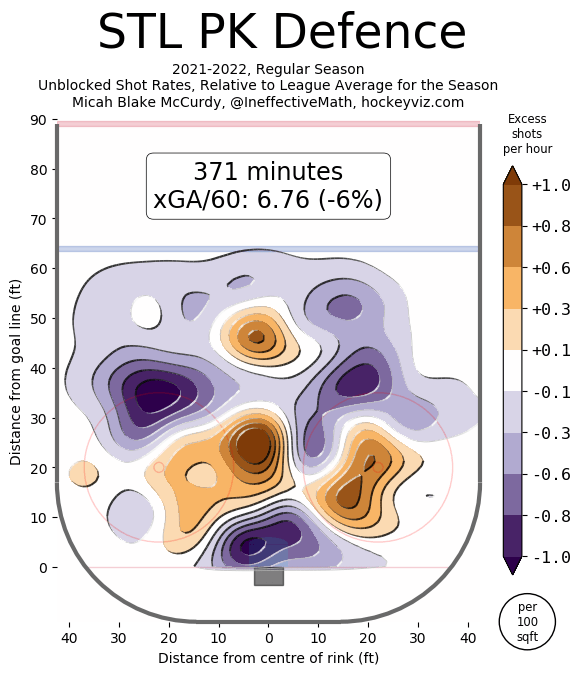
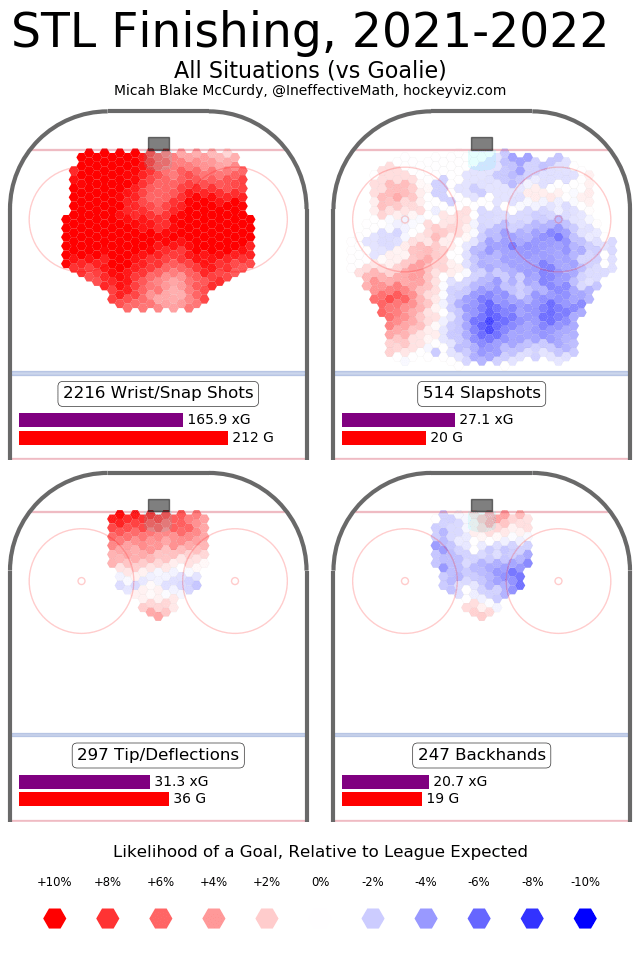
All of this shows the same stuff here. The Blues are mediocre at 5v5 but outscored their problems and then were an elite special teams club that took care of business. As the third-highest scoring team in the NHL, it’s not a huge surprise that St. Louis finished second in the NHL on the power play, but the Blues had the fifth-best penalty kill despite being aggressively mediocre on defense at 5v5.
If the charts aren’t your thing, how about just some straight-up raw data? Here are the Blues ranks at 5v5 this season.
- Corsi For %: 24th
- Shots For %: 24th
- Goals For %: 8th
- Expected Goals For %: 23rd
- Scoring Chances For %: 21st
- High-Danger Chances For %: 25th
- Shooting %: 1st
- Save %: 13th
- PDO: 1st
If you’re unfamiliar with PDO, it’s basically a proxy statistic for “luck”. It is not a statistic you want to finish at the top of during a season because it usually indicates you’re in for a crash somewhere along the way. For the purposes of fairness, Colorado finished 4th in PDO this year, so after beating the Wild, who finished 2nd in PDO, the Blues’ path to their second Stanley Cup appears to be the PDO Olympics.
While this has largely had the tone of a negative look at the Blues, this is a team that scored a ton of goals this year. You might be reminded of the Nashville Predators preview I wrote when I mention this, but St. Louis enjoyed a whole bunch of career years and guys who finished at elite rates.
The big number everyone latches onto is the nine 20-goal scorers for the Blues this year. Nine! That’s a genuinely incredible amount of balance in a forward corps, especially since their highest-scoring defenseman was Justin Faulk with “just” 16 goals.
If nine doesn’t make the point, here’s what the list of their 20-goal guys looks like written out.
- Vladimir Tarasenko
- Pavel Buchnevich
- Jordan Kyrou
- David Perron
- Ivan Barbashev
- Brayden Schenn
- Brandon Saad
- Ryan O’Reilly
- Robert Thomas
That’s an extremely impressive forward corps. The drop-off to their fourth line is gigantic and even their highest-scoring D only had 47, 43, and 35 points. Those are great numbers, but once they got into the postseason you saw a pretty predictable pattern emerge.
While the Blues beat the Wild in six games and advanced, they were clearly the inferior team in three of the games in the series and won a couple of coin-flip games along the way.
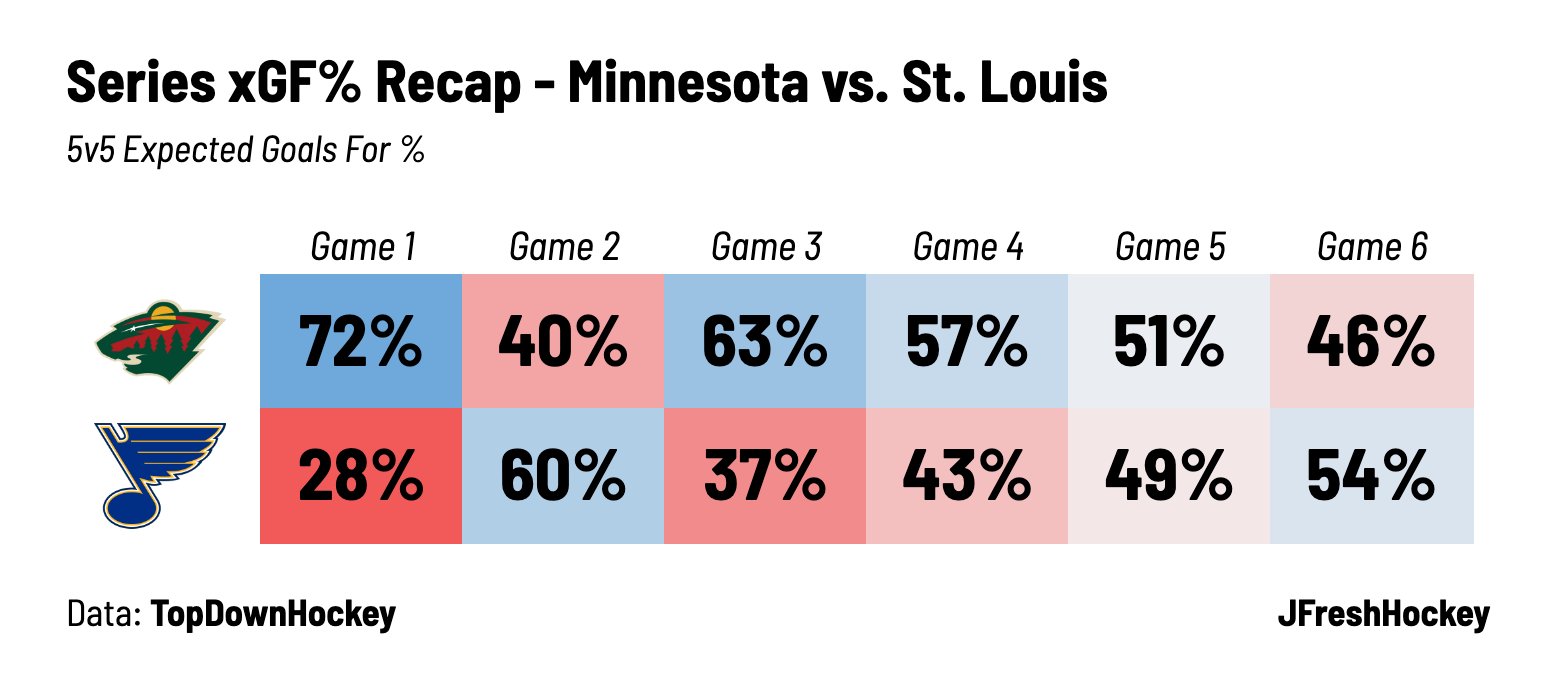
Were it not for Minnesota’s subpar goaltending throughout the series and Ville Husso absolutely stealing Game 1, the Blues very well might not be here right now.
They are, however, and this is the formula they used all season to get here. History has taught us that it’s very tough to make a deep run in the postseason with an offensively inclined group that is iffy defensively and requires their goaltending to straight steal games on a regular basis, but it’s not impossible.
One area of the Blues’ win over the Wild that did stand out to me was that the vaunted scoring depth mentioned earlier disappeared immediately. Nine 20-goal scorers is the kind of great stat you love to boast about, but only four of those players scored more than one goal against the Wild. In fact, of the 22 goals scored by the Blues in their Round 1 series, 18 of them came from just four players (Perron, O’Reilly, Tarasenko, Kyrou).
Just for the sake of comparison, in Colorado’s four-game sweep of Nashville, six Avalanche players recorded more than one goal and five of those six were also 20-goal scorers during the regular season.
Since we’re there, the Avs themselves were no slouches in scoring balance during the regular season as they had seven 20-goal scorers and midseason acquisition Artturi Lehkonen finished with 19 after coming over from Montreal. It’s not hard to think he would have hit the 20-goal mark had he not been forced to wait an extra week to join the Avs thanks to a lengthy immigration process (lengthy for pro sports, anyway) that stalled his transition.
The last area I really want to get into here is that against this Blues club, no lead is safe. St. Louis arguably played its best hockey when trailing and while score effects (the idea that teams play differently based on the score state) certainly have something to do with that, it’s interesting to see just how much better the Blues play when chasing the game.
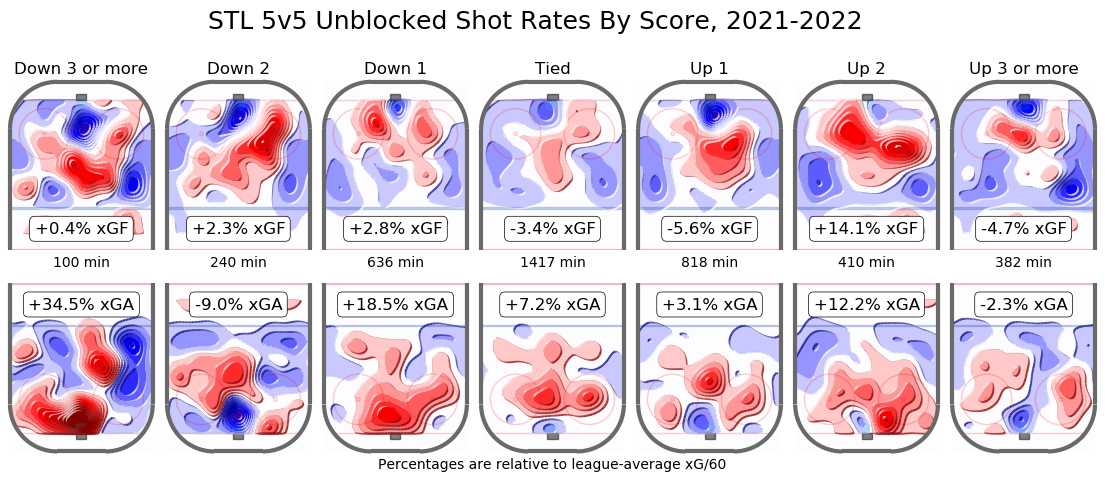
Maybe as much as anything else I’ve dropped here data-wise, this really shows that there isn’t a normal situation in which the Blues are very good defensively and the quality of offense they play doesn’t get going until somebody has a multi-goal lead.
St. Louis produced a 4-14-3 record when trailing after two periods this year but a very strong 8-10-4 when trailing after the first period. This is a team comfortable coming back from leads, so Colorado cannot get complacent and give them opportunities.
All of that is to say, this series has the potential to be major fireworks. Colorado’s beatdown of the Blues last year didn’t feature Perron or Faulk (following the Nazem Kadri incident) and will have full arenas this time around so home-ice advantage might actually play a role here.
The story of this series will be as much the Avalanche facing their own internal demons as the St. Louis Blues, but looking through all of this, that struggle with self might be the biggest obstacle to getting to the conference finals for the first time since 2002. The Blues will put up plenty of resistance, but the reality here is that Colorado is still favored for a reason.
Comments
Share your thoughts
Join the conversation



